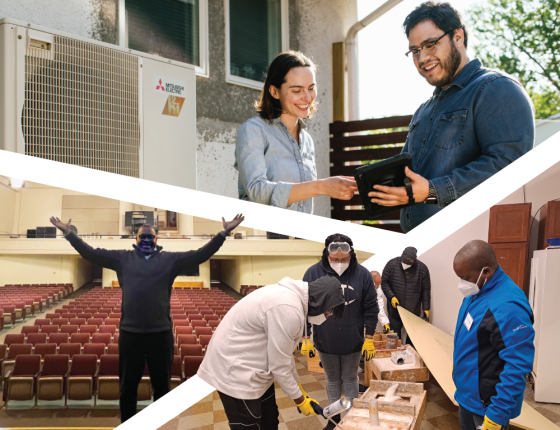Grounded by CEE’s values and history of people-centered programming, we're working intentionally and making progress to improve equity and inclusion throughout our work and workplace. That’s our promise, and like CEE’s other commitments, we track that progress and hold ourselves accountable.
CEE’s Diversity, Equity, and Inclusion (DEI) Council ensures that we report on ongoing opportunities and progress related to inclusion efforts. The Council is made up of 10 committed staff who applied to join, as well as our COO, HR director, and communications director. We meet monthly to discuss, support, and track DEI efforts, and year-round we share learning resources, host small group breakouts on key topics, and bring in well-attended guest speakers to enhance cultural awareness.
We commit to inclusive operations, promoting authentic self-expression, and intentionally engaging those who have been historically underserved or underrepresented.
Staff onboarding, operations
CEE is strengthening our team of 180 energy pros through greater diversity, now with 24% self-identified BIPOC staff (for Black, Indigenous, and other People of Color), up from 10% in 2019. CEE’s supervisors are about 10% BIPOC and our Leadership Team is 14% BIPOC; both groups are split evenly between men and women. CEE's board is 28% BIPOC and 57% women.
CEE has earned a place among “Star Tribune’s Top Workplaces in Minnesota” both times we’ve competed (2020, 2022). The recognition is based solely on staff survey feedback, which we’ve taken care to review by self-identified subsets of race and gender. We also look to our strong staff retention rate of 87.5% as a key reflection of the inclusive employee culture we’re working to foster.
In addition to diversity in hiring and offering staffwide opportunities to learn and engage, we know supportive operational practices are critical stabilizers in culture-building. To that end, all CEE staff who make purchases or hire contractors are required to undertake anti-bias training. For large purchases or contracts, staff complete a procurement form that calls for a diverse pool of candidates and multiple bids. To track progress, we ask all contracted vendors to complete a questionnaire on their company’s leadership, resulting in data collected from about 30 vendors in its first year. Our annual processes for team workplans and performance reviews also include explicit questions about equity and inclusion, and CEE uses market salary analyses to assess staffwide pay equity across gender and race.
To further strengthen the inclusive workplace culture we need to succeed, we require all staff to complete annual training about identities, bias, and microaggressions. Our hiring managers are asked to populate their interview panels with a diversity of lived experiences, and all interview panelists must learn in advance about unconscious biases in hiring. Encouraging everyone to show up as their full, authentic selves at work, we have incorporated gender-neutral bathrooms into our office environment and staff are invited to add their pronouns to online bios and email signatures.
CEE works to reduce energy cost burdens on families living with lower incomes, a group that overlaps significantly with immigrants and communities of color in Minnesota.
Programs
Among CEE’s programs that prioritize inclusion, last year in partnership with Xcel Energy and CenterPoint Energy, our career training program attracted and trained nearly 40 people of color and women to pursue clean energy careers. As the program continues to grow, we partner with culturally specific community anchors such as CAPI USA and Migizi to reach key audiences.
Elsewhere in the region, CEE’s technical expertise supports the clean energy vision and efforts of tribal communities. In partnership with Native Sun Community Power Development, our researchers are leading electric vehicle metrics analysis at Red Lake and Standing Rock reservations to quantify operational costs and emission reductions for an inter-tribal EV charging network. And in the Twin Cities, CEE’s teams partnered in 2022 with local giants such as Sabathani Community Center, one of Minneapolis’s oldest African American nonprofits. The One-Stop Efficiency Shop led big lighting and HVAC renovations at Sabathani’s community center, and our New Homes team supported the build and certifications of the organization’s new apartment building next door.
Across the board, we aim to reduce energy cost burdens that especially impact families struggling with lower incomes, a group that overlaps significantly in Minnesota with immigrants and communities of color. According to the State’s Department of Health, in 2019 about 31% of Native Americans and 29% of Black Minnesotans lived in poverty, as did 19% of Hispanic/Latinos and nearly 14% of Asians. This compares with about 7% of white residents, despite whites accounting for about 4/5 of the population.
So among CEE’s 2023 legislative priorities, we helped land an inclusive state rebate program to build on federal incentives and empower more Minnesotans to improve their homes with efficient heat pumps and insulation. We also co-developed language to raise income eligibility and broaden statewide access to low-income energy efficiency services. Against this backdrop, CEE’s policy team actively advocates for efficiency-directed utility funding in multifamily buildings that would especially improve the energy cost burdens on Black, Indigenous, and People of Color who rent. Last year, we also launched a St. Paul residential pilot program focused on low-income, electrically heated multifamily buildings.
Inclusion is strategic
We seek a healthy, carbon-neutral economy that works for all people — meaning both the colleagues we work with and the communities we work for. This isn’t a soft-focus side goal; it’s self-preservation. Our vision would be unattainable if only a privileged sliver of people were able to participate in it.
CEE has strategically incorporated inclusive practices into our recruitment and onboarding, purchasing and contracting, organizational learning and culture-building, technical research, and programming, because embracing the full breadth of who we are helps us every day to reach further and include more people in CEE’s long-term vision, which needs every great mind and dedicated partner we can muster.
Related Links
Xcel Energy's CIP Workforce Development program, administered by CEE
Case Study: Sabathani Senior Housing Project
